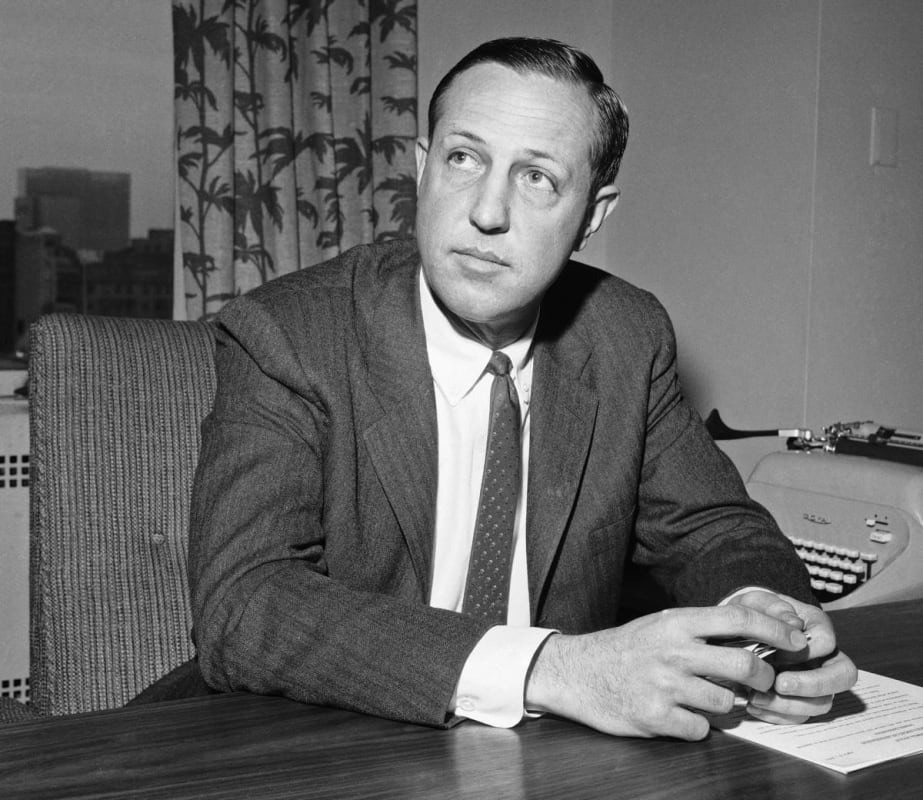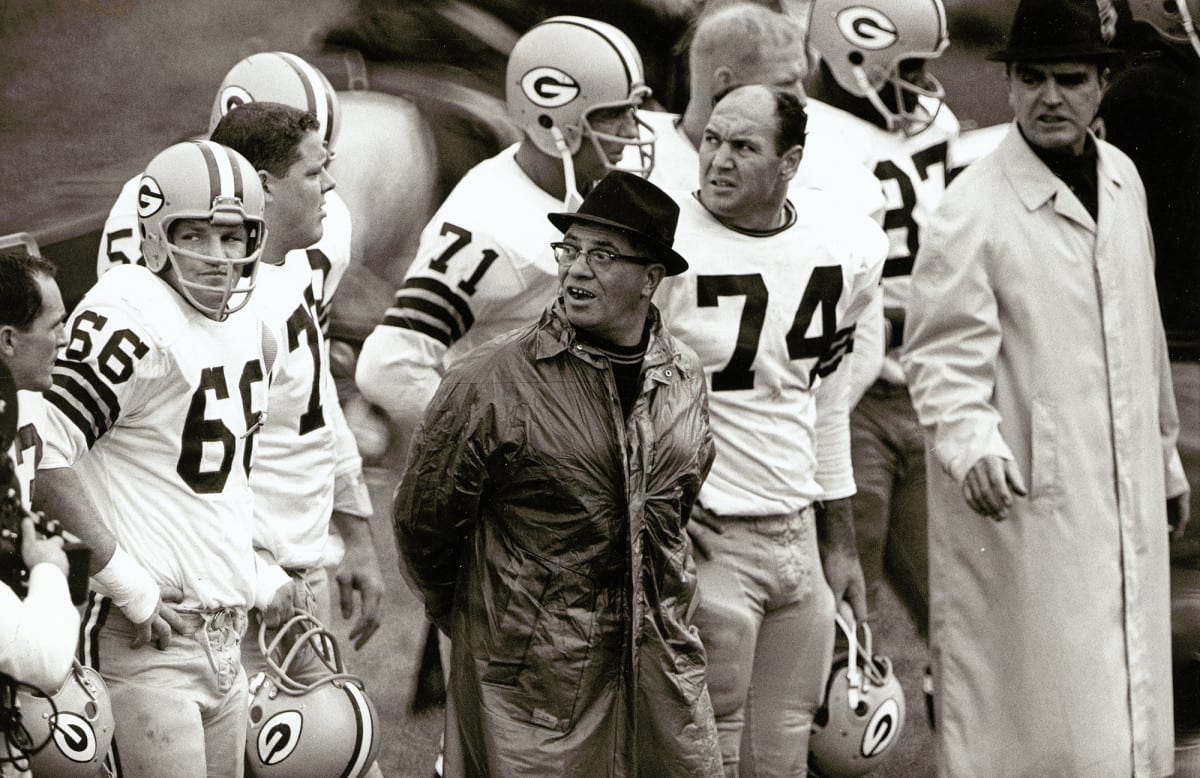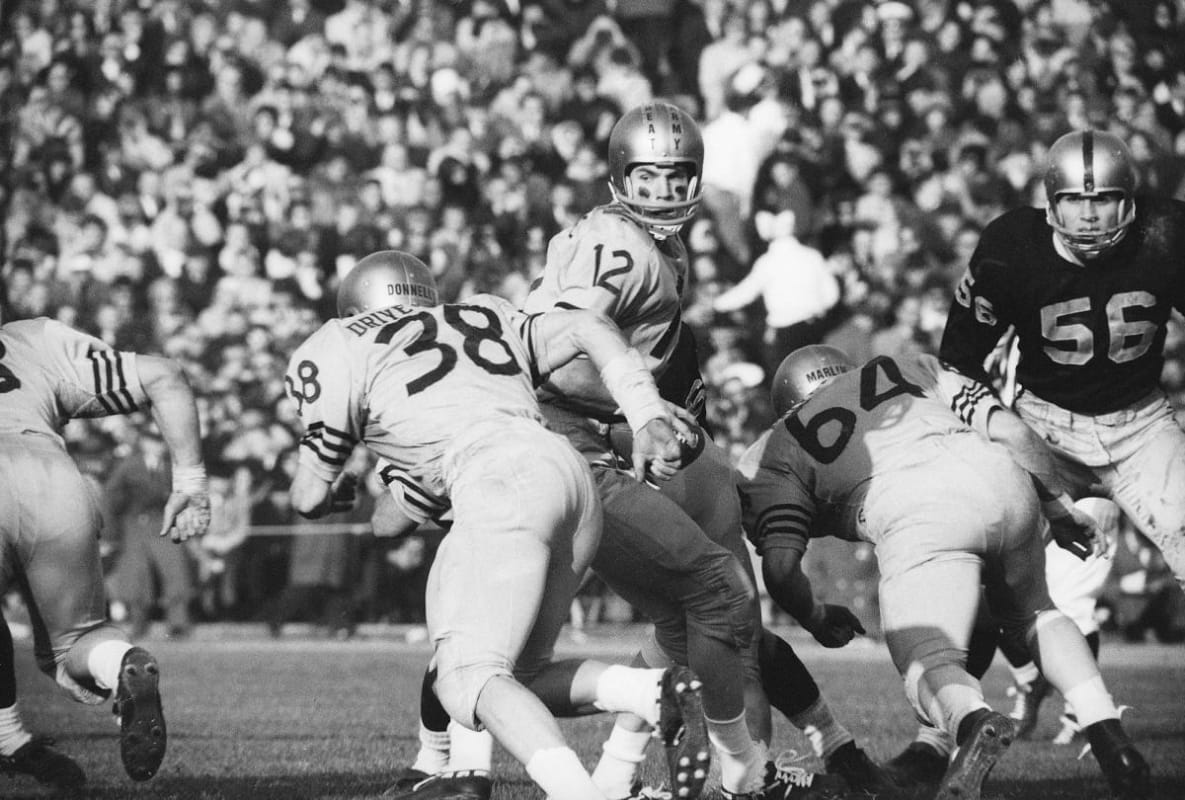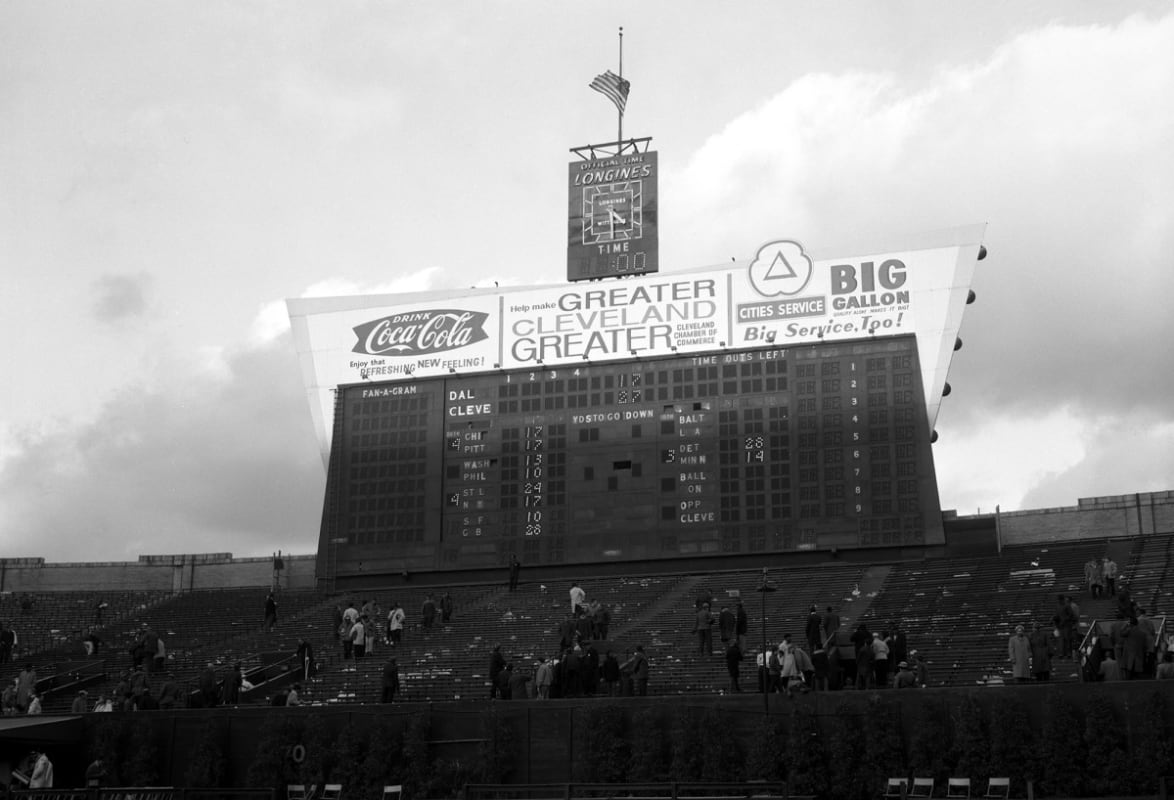On Friday, Nov. 22, 1963, at 12:30 p.m. CT, America changed forever. While waving to crowds from the back seat of his midnight-blue 1961 Lincoln Continental as his motorcade wove through Dallas’s Dealey Plaza, John F. Kennedy was shot. Within an hour, the country was processing the awful news: The 35th president of the United States was dead.
Like every other American, the NFL’s 37-year-old commissioner was in shock. But Pete Rozelle, a former Rams GM who had been on the job for nearly four years, also had a decision to make, and he knew what to do. He picked up a phone at NFL headquarters in New York City and called Pierre Salinger, a friend from their days as classmates at the University of San Francisco and Kennedy’s press secretary.
Somehow, Rozelle reached Salinger at the Honolulu Airport. In less than 48 hours, the NFL was scheduled to play a full slate of seven games. What should the commissioner do?

Anthony Camerano/AP
Salinger told Rozelle that the president would have wanted the games to go on. So they did.
The backlash was swift. The media was outraged that the NFL would play on as the country mourned. (The rival AFL had canceled its schedule for that weekend. Meanwhile, the NBA and NHL played that weekend, and many college football games went on, too.) Even some NFL owners disagreed with Rozelle, including the Eagles’ Frank McNamee, who didn’t attend his team’s home game against Washington. Cleveland’s Art Modell was also against the decision, especially because the Cowboys—the nation turned against Dallas and its institutions in the aftermath of the assassination—were coming to his city.
Rozelle’s decision stuck with him for decades. Publicly, he was contrite. (Thirty years later he called it the “worst decision I ever made.”) Privately, the commissioner felt differently. “He was embarrassed by the negative publicity and attention that the league got for playing the games,” says Joe Browne, an NFL executive who worked for the league in various capacities from 1965 to 2016 and was a longtime Rozelle confidant. “People forget that all kinds of sporting activities and entertainment continued that weekend. . . . He believed down deep that he did the right thing.”
Indeed, the decision to go on with the games hardly dampened the NFL’s rapid 1960s evolution into a sports and cultural behemoth. But 38 years later, Rozelle’s angst colored another dilemma faced by his successor, Paul Tagliabue, as he walked from his New York City apartment to the NFL offices on Park Avenue, looking skyward at the smoke emanating from the fallen World Trade Center.

Neil Leifer/Sports Illustrated
Ed O’Bradovich remembers the day of JFK’s assassination well. He can’t forget it.
That Friday was unseasonably warm, a 60° November afternoon in Chicago. The Bears were practicing at Wrigley Field in a drizzle. The ivy on the stadium’s outfield walls was browned and shriveled, ready for a long winter’s nap. The mood was good. Chicago was coming off a home victory over Vince Lombardi’s Packers, putting the Bears a game ahead of their Western Conference rival with four games to play.
Then, shock. Word broke on the field that Kennedy had been assassinated. “Each guy kind of went his own way, but it was stunning,” says O’Bradovich, a defensive end for the Bears from 1962 to ’71. “The president of the United States was shot and killed? Where? Dallas? How could this happen?”
After practicing once more on Saturday, the Bears drove to O’Hare and took a charter to Pittsburgh. Unlike most other flights, there was little chatter and no card games, only a feeling of numbness. “When the NFL announced we were going to play, I can tell you this, our hearts weren’t in the game,” says O’Bradovich, 83. “I can’t speak for the Steelers, but I’d assume they felt the same way. What the hell are we doing, playing?”
In Green Bay, Lombardi was both somber and irritated. Kennedy was a personal friend. The two had shared the dais at a Wisconsin campaign stop in 1960 and hit it off. Kennedy gave Lombardi his personal phone number, which the coach used in ’61 to ask for a favor: springing Hall of Fame halfback Paul Hornung—whose Army reserve unit had been called to active duty at Fort Riley, in Kansas—so he could play in the NFL championship game. (The Golden Boy scored 19 points in a 37–0 Packers win.)
Now Lombardi’s sense of loyalty left him at odds with Rozelle. “Coach Lombardi advocated for canceling the game, and we all felt that was appropriate,” says Hall of Fame guard Jerry Kramer, who is now 87 and played with the Packers from 1958 to ’68. “Coach had a relationship with JFK, and he was pretty upset. Of course we were upset, too. He didn’t actually break down and cry or anything, but he was very terse and short in his announcements. ‘We’re going to play. Commissioner said we’re going to play.’ And that’s it.”
And so, on Nov. 24, 1963, the NFL played. It was hardly a normal football Sunday. All three networks were devoted to wall-to-wall JFK coverage, so instead of seeing the Washington-Philadelphia game, fans tuning in to CBS that afternoon saw coverage of the death of accused assassin
Lee Harvey Oswald, who was gunned down on live TV by nightclub owner Jack Ruby 39 minutes before the day’s games kicked off.
Hundreds of thousands of fans learned of Oswald’s killing on transistor radios inside NFL venues. Despite the horror of the prior 48 hours and the outcry over football being played, the stadiums were packed. Cleveland Municipal Stadium, Franklin Field in Philadelphia, Forbes Field in Pittsburgh . . . all of them. Rozelle himself was at Yankee Stadium, taking in a key Eastern Conference contest between the Giants and the St. Louis Cardinals. At one point, New York quarterback Y.A. Tittle had to implore the crowd to quiet down while trying to bark out signals.
Both Green Bay (8–2) and Chicago (9–1) played meaningful games that day. The Packers easily handled the 49ers, 28–10, while the Bears, who would go on to win the NFL title a month later, had a much tougher time with the Steelers, playing to a 17–17 tie. “I remember the overwhelming sadness of the situation,” says Kramer. “It wasn’t a momentary-and-disappear kind of thing. It hung over you for days.”
Still, a weekend that began with a perceived misstep by Rozelle ended up being a statement about pro football’s emerging place in the American psyche. After decades of the NFL being a distant second to Major League Baseball among the men’s big four leagues, the degree to which it drove conversations in the days after one of America’s ugliest moments showed just how much the league mattered—not just as a diversion, but also as a cultural phenomenon.

Neil Leifer/Sports Illustrated
For months, all Budd Thalman and the Navy football team wanted to do was return to Dallas. Then, in an instant, it was the last place they wanted to be.
In 1963, the Midshipmen were a powerhouse. They entered the annual Army-Navy game, scheduled for Nov. 30, with an 8–1 record. With a victory over Army, Navy would earn a berth in the Cotton Bowl and the chance to play Texas for the national title.
The season had largely been a dream. Junior quarterback Roger Staubach was about to win the Heisman Trophy and had spent part of the fall prepping for a cover story that would never run.
“The week before [Kennedy’s assassination], a Life photographer was following Staubach around the campus,” says Thalman, Navy’s sports information director from 1962 to ’73. “I said to him, ‘Is there any way Staubach won’t be on the cover?’ He said, ‘Only some sort of catastrophe.’ ”
Thalman still has the cover that never ran. Life printed 300,000 copies before pulling it. It hangs on the wall of his home. He got a copy for Staubach as well.
Kennedy had, of course, been a Navy man, earning a Purple Heart in World War II. The feeling in Annapolis was that the Army game wouldn’t be played, but it was an event that meant a great deal to Kennedy, who attended in 1961 and ’62 with plans to do so again in ’63.
“What I heard in the office and talking to other people in the academy was that it would not be played,” Thalman says. “My understanding these 60 years later is that it was played because Mrs. Kennedy said it should be. She said that’s what the president would want.”
Many of the Midshipmen had met the president at Quonset Point, R.I., in 1962 when Kennedy flew into the naval air base there on his way to Cape Cod. Upon his arrival, the team changed from practice gear to dress whites and lined up to shake hands with their commander in chief.
Fifteen days after Kennedy’s assassination, on the 22nd anniversary of the Pearl Harbor attacks, the Midshipmen stuffed Army near the goal line as time ticked away. Navy was going to the Cotton Bowl. Going to Dallas.
There was talk of skipping the trip, but eventually Navy decided to go. (The Middies would lose to Texas, 28–6.) So it was that on Christmas Day, Thalman found himself standing in front of the Texas School Book Depository, the building from which Oswald had fired his fateful shots. Thalman stared at the building, surrounded by other people doing the same thing for reasons nobody could explain. “I just thought I should be there,” Thalman says. “It was just one of those things, you say to yourself. It was hallowed ground. I thought I should be there.”
Paul Tagliabue could do only what every other American was doing as the September 11 attacks unfolded: He watched in horror.
Tagliabue, an NFL lawyer under Rozelle before taking over as the league’s seventh commissioner when Rozelle retired in 1989, now had to navigate his own national crisis. Unlike Rozelle, who had 48 hours until his games were scheduled to kick off, Tagliabue had five days. And although the Kennedy assassination had taken place almost four decades earlier, it was one of the key considerations in Tagliabue’s planning.
The NFL had played the day Pearl Harbor was bombed. It had played two days after Kennedy was killed. Yet Tagliabue was charting a new course, believing the right move was to pause, not push on. “Fortunately, Paul had enough time to think about what would be right for the league and country, and he did not play,” Browne says. “But there were owners both in ’63 and 2001 who thought we aren’t going to let terrorists ruin and upset our way of life. That we should continue with business as usual.”
Tagliabue wasn’t alone in his choice to stop. Major League Baseball halted its pennant races, postponing games for a week before resuming play. In the end, despite the one-week interruption, all 248 regular-season games were played that season. Tagliabue is roundly credited with making the right choice.

Henry Barr Collection/Diamond Images/Getty Images
On Jan. 6. 1964, 45 days after Kennedy was assassinated, Sports Illustrated released its Sportsperson of the Year issue. The cover was adorned with each of the 14 NFL helmets and a man in a black suit and red tie, the left side of his face covered by a shadow: Pete Rozelle.
The accompanying eight-page story did not mention the decision to play after Kennedy’s assassination until midway through. Instead, it largely focused on the deft handling of the NFL’s gambling crisis from April 1963, when Hornung and another future Hall of Famer, Alex Karras, were suspended indefinitely (and reinstated for ’64) for wagering on sports, including NFL games. Said Cowboys general manager Tex Schramm in the piece, “Pete Rozelle’s handling of the investigations was the thing that made everybody accept him as commissioner and no longer a boy playing the part. He gained once and for all everybody’s complete respect.”
Historically, the decision to play two days after Kennedy was gunned down is more resonant. But at the time, Rozelle’s ability to mitigate what could have been an irreparable blight on the NFL’s on-field product was seen as being of paramount importance.
For Rozelle, it was the most challenging year in what became arguably the most esteemed career for a North American sports executive. Says Michael MacCambridge, NFL historian and author of America’s Game: The Epic Story of How Pro Football Captured a Nation, “After 29 years of leadership in which he is generally considered the greatest commissioner of all time, if his greatest mistake was that he played games the Sunday after JFK was shot, as great mistakes go, that was not a bad one.”







